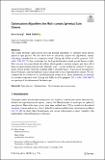| dc.contributor.author | Huang, Brice | |
| dc.contributor.author | Sellke, Mark | |
| dc.date.accessioned | 2024-02-26T18:52:31Z | |
| dc.date.available | 2024-02-26T18:52:31Z | |
| dc.date.issued | 2024-02-24 | |
| dc.identifier.issn | 1572-9613 | |
| dc.identifier.uri | https://hdl.handle.net/1721.1/153576 | |
| dc.description.abstract | This paper develops approximate message passing algorithms to optimize multi-species spherical spin glasses. We first show how to efficiently achieve the algorithmic threshold energy identified in our companion work (Huang and Sellke in arXiv preprint, 2023. <jats:ext-link xmlns:xlink="http://www.w3.org/1999/xlink" ext-link-type="uri" xlink:href="http://arxiv.org/abs/2303.12172">arXiv:2303.12172</jats:ext-link>), thus confirming that the Lipschitz hardness result proved therein is tight. Next we give two generalized algorithms which produce multiple outputs and show all of them are approximate critical points. Namely, in an <jats:italic>r</jats:italic>-species model we construct <jats:inline-formula><jats:alternatives><jats:tex-math>$$2^r$$</jats:tex-math><mml:math xmlns:mml="http://www.w3.org/1998/Math/MathML">
<mml:msup>
<mml:mn>2</mml:mn>
<mml:mi>r</mml:mi>
</mml:msup>
</mml:math></jats:alternatives></jats:inline-formula> approximate critical points when the external field is stronger than a “topological trivialization" phase boundary, and exponentially many such points in the complementary regime. We also compute the local behavior of the Hamiltonian around each. These extensions are relevant for another companion work (Huang and Sellke in arXiv preprint, 2023. <jats:ext-link xmlns:xlink="http://www.w3.org/1999/xlink" ext-link-type="uri" xlink:href="http://arxiv.org/abs/2308.09677">arXiv:2308.09677</jats:ext-link>) on topological trivialization of the landscape. | en_US |
| dc.publisher | Springer Science and Business Media LLC | en_US |
| dc.relation.isversionof | 10.1007/s10955-024-03242-7 | en_US |
| dc.rights | Creative Commons Attribution | en_US |
| dc.rights.uri | https://creativecommons.org/licenses/by/4.0/ | en_US |
| dc.source | Springer US | en_US |
| dc.subject | Mathematical Physics | en_US |
| dc.subject | Statistical and Nonlinear Physics | en_US |
| dc.title | Optimization Algorithms for Multi-species Spherical Spin Glasses | en_US |
| dc.type | Article | en_US |
| dc.identifier.citation | Huang, B., Sellke, M. Optimization Algorithms for Multi-species Spherical Spin Glasses. J Stat Phys 191, 29 (2024). | en_US |
| dc.contributor.department | Massachusetts Institute of Technology. Department of Electrical Engineering and Computer Science | |
| dc.relation.journal | Journal of Statistical Physics | en_US |
| dc.identifier.mitlicense | PUBLISHER_CC | |
| dc.eprint.version | Final published version | en_US |
| dc.type.uri | http://purl.org/eprint/type/JournalArticle | en_US |
| eprint.status | http://purl.org/eprint/status/PeerReviewed | en_US |
| dc.date.updated | 2024-02-25T04:13:04Z | |
| dc.language.rfc3066 | en | |
| dc.rights.holder | The Author(s) | |
| dspace.embargo.terms | N | |
| dspace.date.submission | 2024-02-25T04:13:04Z | |
| mit.journal.volume | 191 | en_US |
| mit.journal.issue | 2 | en_US |
| mit.license | PUBLISHER_CC | |
| mit.metadata.status | Authority Work and Publication Information Needed | en_US |
